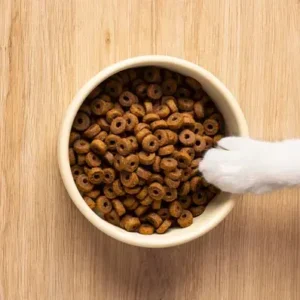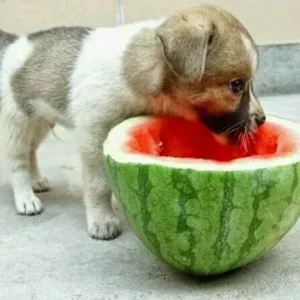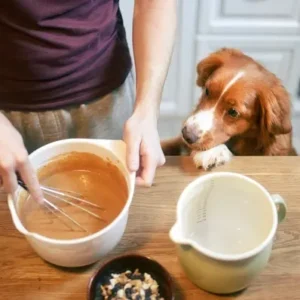Risks of Feeding Potatoes to Dogs
Although potatoes have some nutritional value, there are risks associated with feeding them to your dog:
- Raw Potatoes and Solanine Toxicity: Raw potatoes and their skins contain solanine, a natural compound that can be toxic to dogs. Cooking significantly reduces solanine levels, making the potato safe for consumption.
- Fried and Seasoned Potatoes: French fries, chips, or potatoes cooked with butter, salt, or spices are not safe for dogs. These additives can cause digestive upset, lead to weight gain, and even harm your dog’s kidneys or heart.
- Overconsumption: Potatoes are high in carbohydrates, which can contribute to obesity and exacerbate conditions like diabetes when given in large quantities.
For dogs with certain health issues, such as obesity or diabetes in dogs, potatoes may not be suitable at all. Always consult your veterinarian before adding potatoes to your dog’s diet.
How Many Potatoes Can Dogs Eat?
Potatoes can be a safe treat for dogs when cooked and served plain. If you’re introducing potatoes to your dog’s diet, start with a small amount to monitor for any adverse reactions.
The amount of potato you can safely feed your dog varies based on their size and dog breed. Here’s a general guideline to follow:
| Dog Size | Weight Range | Serving Size | Examples |
| Extra-Small Dogs | 2–20 pounds | 1 teaspoon of cooked, plain potato | Yorkie, Chihuahua, Pomeranian, Pug, Shih Tzu |
| Small Dogs | 21–30 pounds | 1–2 teaspoons of cooked, plain potato | Basenji, Beagle, Miniature Australian Shepherd |
| Medium Dogs | 31–50 pounds | 2–3 teaspoons of cooked, plain potato | Basset Hound, Border Collie, Australian Cattle Dog, Siberian Husky |
| Large Dogs | 51–90 pounds | 1–2 tablespoons of cooked, plain potato | Pit Bull, German Shepherd, Labrador Retriever, Australian Shepherd |
| Extra-Large Dogs | 91+ pounds | 3–4 tablespoons of cooked, plain potato | Newfoundland, Bernese Mountain, Saint Bernard, Great Pyrenees |
Signs Your Dog May Have Eaten Too Many Potatoes
Feeding your dog too many potatoes, or serving them improperly, can lead to health issues. Watch out for these signs:
- Digestive Upset: Vomiting, diarrhea, or gas can indicate that your dog has consumed too much potato or eaten it in an unsafe form.
- Symptoms of Solanine Poisoning: Lethargy, drooling, difficulty breathing, or confusion may occur if your dog has ingested raw potatoes or potato plants.
- Allergic Reactions: Uncommon but possible, symptoms may include itching, swelling, or hives.
If you notice any of these symptoms, contact your veterinarian immediately for advice.
How to Safely Prepare Potatoes for Dogs
Proper preparation is key to ensuring potatoes are safe for dogs. Follow these tips:
- Cook Thoroughly: Boil, bake, or steam potatoes until they are soft. Never serve raw or undercooked potatoes.
- No Additives: Avoid using butter, salt, oil, or spices, as these can be harmful to your dog’s health.
- Peel the Potato: Potato skins may contain higher levels of solanine, so it’s best to remove them before cooking.
- Control Portion Sizes: A small piece of potato as an occasional treat is sufficient. Potatoes should make up no more than 10% of your dog’s daily caloric intake.
By following these guidelines, you can safely share potatoes with your dog without compromising their health.
Are Sweet Potatoes Better Than Regular Potatoes?
Sweet potatoes are often recommended as a healthier alternative to white potatoes. Here’s why:
- Nutritional Superiority: Sweet potatoes are rich in dietary fiber, vitamin A, and antioxidants, which support digestion, vision, and overall health.
- Lower Glycemic Index: Sweet potatoes cause a slower rise in blood sugar levels, making them a better choice for dogs with blood sugar sensitivities.
- Flavor and Texture: Dogs tend to enjoy the natural sweetness and soft texture of cooked sweet potatoes.
While sweet potatoes are generally more beneficial, they should also be given in moderation to avoid overloading your dog’s diet with carbohydrates.
Potatoes in Commercial Dog Food
Potatoes are a common ingredient in many commercial dog foods, especially grain-free formulas. They act as a carbohydrate source and help bind kibble. While this is generally safe, some experts are concerned about diets that rely too heavily on potatoes. Studies suggest a possible link between grain-free diets and heart disease (dilated cardiomyopathy) in dogs.
When choosing dog food, look for a balanced formula with a variety of protein, fiber, and nutrient sources.
Other Vegetables and Fruits Dogs Can Eat
In addition to potatoes, many other healthy fruits and vegetables make a great, nutritious snack for your dog.
Here are some dog-friendly options:
- Dogs can eat apples – An excellent source of vitamins and fiber. Remove the seeds and core.
- Dogs can eat blueberries – Packed with antioxidants for a strong immune system.
- Dogs can eat bananas – High in potassium and fiber. Feed in moderation due to sugar content.
- Dogs can eat cucumbers – A hydrating, low-calorie snack, and perfect for weight management.
- Dogs can eat pumpkin – High in fiber and help with digestion and upset stomachs.
- Dogs can eat green beans – Low-calorie, high in fiber, ideal for weight loss.
- Dogs can eat watermelon – Hydrating and full of vitamins. Remove seeds and rind.
Including a variety of dog-safe fruits and vegetables in your pet’s diet can provide essential nutrients and promote overall health. Always introduce new foods gradually, monitor for adverse reactions, and consult your veterinarian for guidance.








